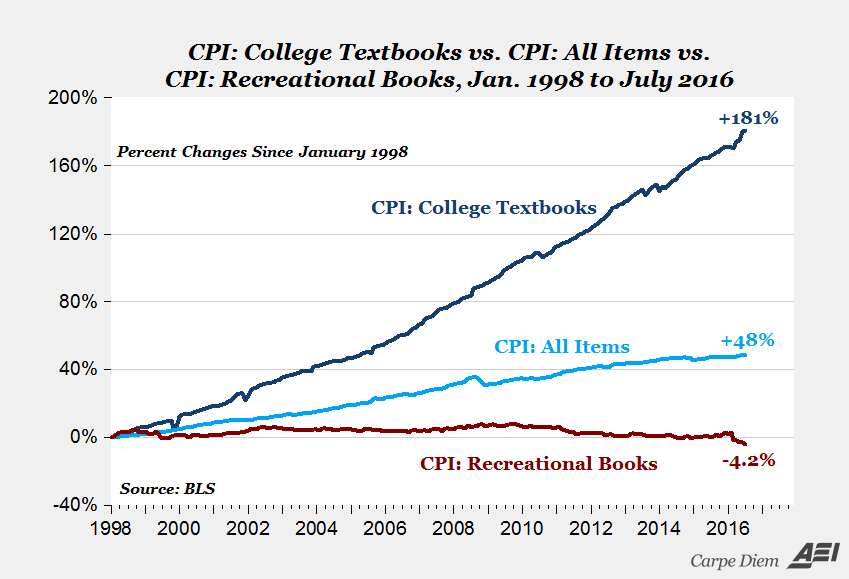Why Are College Textbooks So Expensive?

Are you sick of tired of paying hundreds of dollars for a textbook you might only crack open once all semester?
Yeah, I thought so.
We all know textbooks are expensive by now. That part doesn’t really come as a surprise to us anymore. On the other hand, that awareness still doesn’t ease the sticker shock of adding up your book costs for one semester.
So why DO textbooks cost a small fortune? Let’s find out.
Why Are College Textbooks So Expensive?
According to the College Board, the average college student in a four-year program pays $1,250 per year on textbooks. That’s a serious obstacle for students who are already dealing with rising tuition costs.

The American Enterprise Institute also investigated the rising prices of textbooks. They found that the cost of recreational books, like novels, has gone down.
While college textbooks have gone up nearly 200%. Who’s to blame? There are a number of factors.
College Professors Level of Awareness
Professors frequently assign book titles without considering how much the text cost the students...or how much their students will actually USE the books that semester.
It’s not that professors are out to get us. They just might not be aware of how expensive the book really is--or they don’t think about the price at all.
Book publishers pressure educators too. They have sales reps that come onto campus and push the latest edition, bundled with software. At the end of the day, you professor really has no reason to keep the costs of their book down.
In this case, we have to educate our professors as well.
Ask them at the beginning of the semester (or prior to the start of it) if you REALLY need the latest edition of the textbook--or if you can get through the semester with a used copy. Explain to them that you want to do well in their class but the cost of the textbook is holding you back.
Book Publishers Want Profits
Publishers play the main role in driving up book costs.
Did you know there are only 5 major book publishers that run the textbook market? That’s right, 80% of the market is controlled by these 5 textbook publishers.
And they’re hungry for profits. They bundle textbooks with software and unique codes that forces students to buy the latest edition.
These traditional publishers don’t make money off you purchasing used books--so they do everything in their power to make those older editions “out of date” and useless.

Campus Bookstores Markup Retail Prices
Your campus bookstore wants to make money too. Book publishers are hungry for profit...but so are universities.
Campus bookstores usually mark the retail price of a textbook up by 25-28%. Depending on how much your book costs, this markup can be significant. That means a $200 textbook becomes $250 at the bookstore.
Look closely at your college bookstore website. You’ll probably come across a pricing policy section that explains what their current markup is.
However, this isn’t to vilify your campus bookstore. It costs them money to run the bookstore--they have overhead like paying their employees. To be honest, many campus bookstores are owned by Barnes & Noble anyway.
It Depends on Your Field of Study
Information changes rapidly depending on what field you’re studying. If you’re in a field like medical or science? They’re constantly discovering new information and the textbooks have to be updated as a result.
However, if you’re studying a field like math, you’ll find the information doesn’t really change. With this in mind, you can most likely get away with an older textbook version.
Search via Textbook Nova
Fortunately, the internet is changing the textbook industry. Website search engines like ours--TextbookNova.com--can save you money.
Search for your assigned text via the ISBN. The ISBN is the bar-code number for the textbook; it should be 10 digits or 13 digits. Why is this so important? Well, it lets you know that you’re getting the right version/edition of the book.
Once you’ve the right textbook, you’ll see options for buying it full price, used, or renting it (usually the cheapest). If you want to go with a used edition, you can price compare multiple price range options based on the condition of the book.
What’s Next?
All in all, today’s textbook publishing model and the rising costs won’t last. It just isn’t sustainable. Open-sourced material is spreading online and the internet has given students far more options for price shopping.
The more we understand about why we’re paying so much for a textbook, the more can do to influence the current system.

